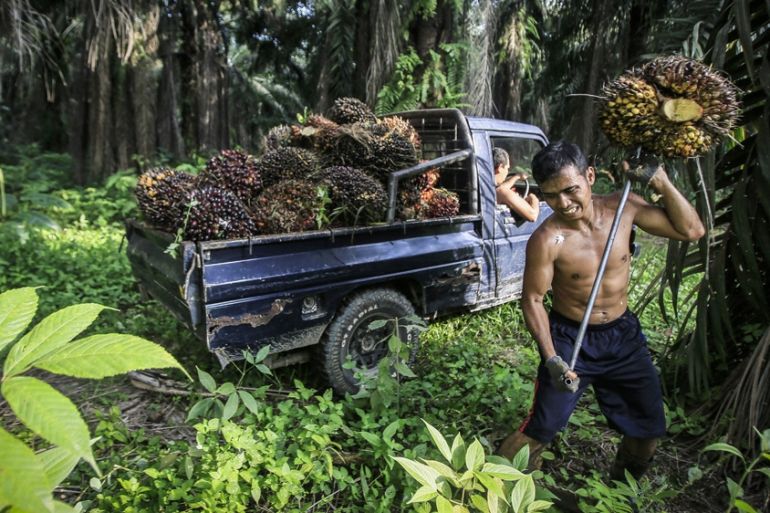Tougher palm oil rules agreed amid polarising debate over crop
Supporters describe new standards as ‘transformative’, but critics are calling for a complete ban of the crop.

The organisation promoting the sustainable cultivation and use of palm oil has agreed to tighten rules on the production of the crop, requiring companies to commit to not cause deforestation or plant on wetland in order to secure certification, amid contentious debate over the product’s use and impact on the environment.
The Roundtable for Sustainable Palm Oil (RSPO) reviews the rules governing certification every five years.
Keep reading
list of 4 itemsCould shipping containers be the answer to Ghana’s housing crisis?
Thousands protest against over-tourism in Spain’s Canary Islands
Holding Up the Sky: Saving the Indigenous Yanomami tribe in Brazil’s Amazon
The revision took place as campaigners, particularly in Europe, stepped up calls for a ban on the use of palm oil because of its effect on the world’s rainforests.
RSPO Secretary-General Darrel Webber described the new standards as “transformative.”
|
|
Previous requirements were criticised for failing to protect all forests or provide adequate social safeguards.
The group has also been denounced for failing to act against those that had broken the rules.
To meet the RSPO’s new certification standards, growers will have to ensure future land clearance does not cause the deforestation of critical forests, under a methodology known as the High Carbon Stock Approach.
‘Great step forward’
Jennifer Lucey, an environmental scientist at the University of Oxford, helped develop the approach alongside Greenpeace and the plantation industry.
Lucey described the decision as a “great step forward” that would protect more forest over larger areas.
Indonesia and Malaysia produce more than 85 percent of the global supply of palm oil, which is used in products from chocolate to ice cream, shampoo and lipstick.
But the crop has also driven deforestation and contributed towards pollution and climate change as land, including carbon-rich peatlands, has been converted to plantations.
The tropical rainforests of the two countries are biodiversity hotspots and home to endangered species, including the orangutan.
In a statement, WWF noted that nearly all RSPO members, including growers, retailers and banks, had given the revisions their support.
![An aerial view of a plantation in Indonesia's Riau from 2013 when land for plantations was cleared by burning, smothering the region in a smoke haze. [File/Beawiharta/Reuters]](/wp-content/uploads/2018/11/87031150f6e04466a21b0ff44ea40618_18.jpeg)
“(RSPO) now has stronger safeguards on issues including deforestation, expansion on peat and exploitation of labour,” WWF Palm Oil Lead Elizabeth Clarke said in a statement.
“The RSPO and all its members must now deliver on their commitments to bring sustainable palm oil to consumer markets.”
The roundtable was established in 2004 as a response to rising concern about the industry’s environmental impact; its members include plantation companies, palm oil buyers and environmental groups.
RSPO certification standards are supposed to set best practices for the production and sourcing of palm oil. Indonesia and Malaysia have also introduced their own sustainability certification.
Sustainability vs ban
But the environmental debate has become increasingly rancorous, with some campaigners calling for palm oil to be banned completely.
The British supermarket chain, Iceland, attracted widespread attention this month after a commercial featuring an animated orangutan, Rang-tan, in which the retailer announced it was committed to going palm oil free was allegedly banned by UK advertising regulators.
WWF stressed that sustainability requires more than certification and that the industry, governments and the financial industry also needed to take steps to include smaller growers in sustainability, as well as to improve and enforce land use planning and legal compliance.
|
|
Palm oil produces more oil per unit of land area than any other vegetable oil grown today.
Globally, it provides 35 percent of the world’s edible oil needs on just 10 percent of the land, according to WWF.
Its yield is about six times more than canola, the next most productive crop, 10 times more than soybean and 11 times more than sunflower, the University of Oxford’s Lucey said.
“Replacing it with something else is not a more environmentally-friendly option,” Lucey said.
“Whether we like it or not, palm oil is here to stay. As consumers, we should be registering our concerns by buying sustainable palm oil, not avoiding palm oil altogether.”